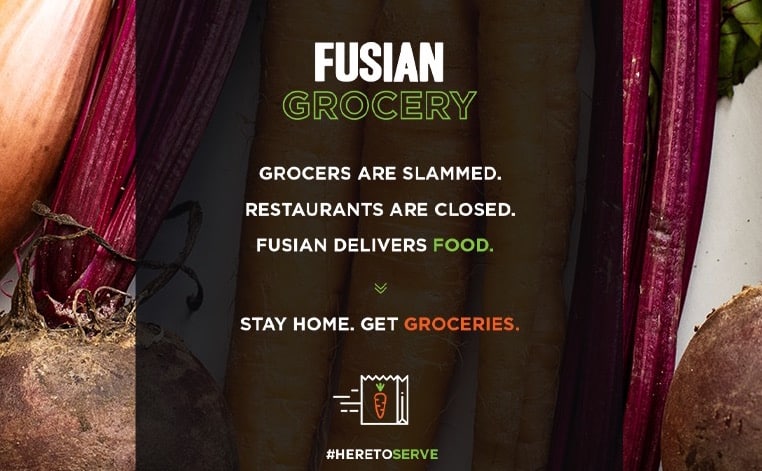Restaurant sales have taken a dive off a cliff. Grocery stores are struggling to keep food on the shelves. And the ongoing coronavirus outbreak is threatening to cost countless restaurant workers their jobs.
Now a Columbus, Ohio–based fast casual has an idea that could help solve all of those problems. FUSIAN, a 10-unit concept serving sushi rolls and bowls in four Ohio markets, is launching a new grocery delivery service that will leverage its online ordering platform to help local restaurant supply warehouses offload surplus inventory.
“The supply chain is strong: Growers are growing, farmers are farming, in many places seeds are in the ground,” says FUSIAN cofounder Stephan Harman. “We have many local supply houses that solely supply restaurants. We have a lot of surplus in inventory right now in these warehouses where restaurants that were planning to buy from them have canceled.”
Harman says many of these warehouses were stocked in preparation for big business associated with March Madness and St. Patrick’s Day. But with that business disappearing overnight and restaurants canceling orders, the warehouses were unable to move food to supermarkets and risked letting it go to waste.
FUSIAN’s efforts look like this: The company purchases leftover inventory (particularly perishables) from the warehouses and stores it in its restaurants—which, like many other restaurants around the country, were mandated to close their dining rooms and switch to an off-premises service model only. People within an 8–10 mile radius of a FUSIAN location can then order the groceries digitally through the brand’s online platform, and have them delivered to their home.
“We feel like FUSIAN is in a position right now to leverage our platform to become a grocer in many ways, and take some of the burdens off of the grocery chains,” Harman says, noting how overwhelmed many groceries have become as scared consumers flock to their stores for supplies.
FUSIAN has adapted its business in other ways to accommodate the coronavirus crisis. It’s offering $1 delivery daily through its app, free delivery on Fridays, and $5 off for anyone placing their first online order. It developed a $1 Peanut Butter & Jelly Roll for kids, plus it’s offering Meal Kits for large groups.
But the new grocery platform is a complete evolution from its normal business model. Harman says FUSIAN is working with its third-party partners and Amazon to facilitate deliveries, and is also relying on an in-house fleet of drivers. FUSIAN’s employees, he adds, are especially important to the new model, as the brand is trying to find more ways to keep workers busy so they don’t have to lose hours.
The resulting platform, he says, is a win-win-win for everyone interested in continuing to move food through the supply chain and provide for those in need.
“Grocery stores win by diverting some of their burden onto new supply chains. Customers win because they can stay in their homes and they can keep their safe distance and continue to eat. FUSIAN wins because we can keep people employed and keep the wheels moving,” Harman says. “And ultimately our suppliers and our growers and our farmers win because we can keep serving meals.”
Harman says new and innovative ideas are necessary today as restaurant operators navigate through the coronavirus pandemic.
“As a friend of mind says, tough times don’t last but tough people do,” he says. “We feel like we’re pretty tough and we’re going to rise above it and keep the wheels moving.”






